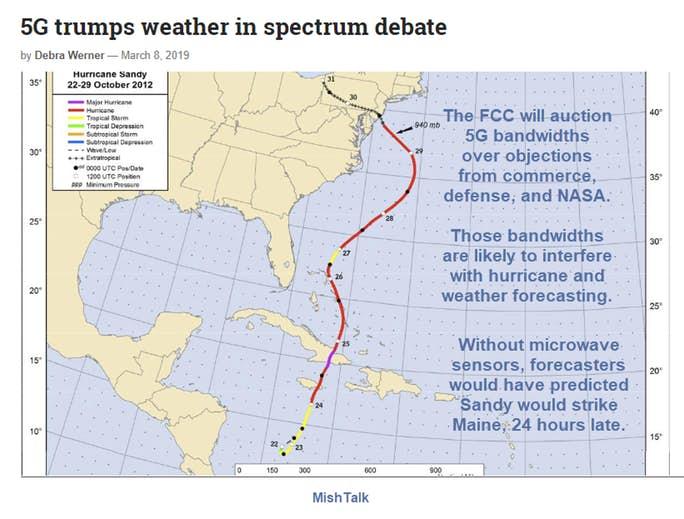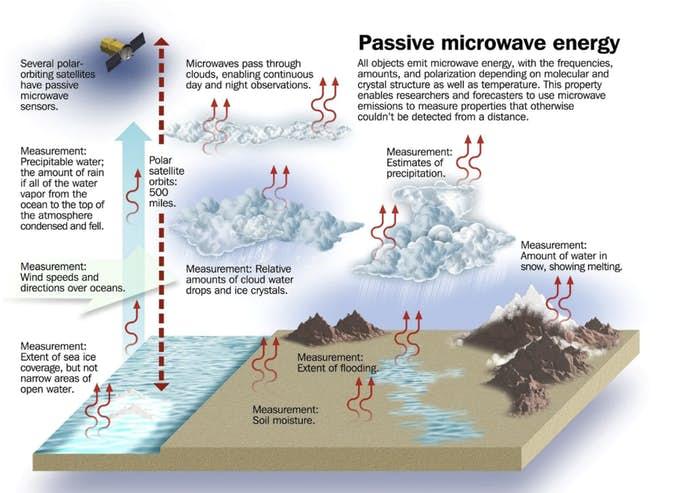The FCC is poised to auction off a 5G bandwidth that is likely to interfere weather forecasts.
The FCC, which want to proceed with a 5G auction, is at odds with the commerce department, the defense department, and NASA.
The dispute regards wavelength frequencies currently used by public and private weather satellites, weather balloons, and ocean buoys to predict the weather.
NASA and the Commerce department have serious concerns.
Please consider Critical weather data threatened by FCC ‘spectrum’ proposal, Commerce Dept. and NASA say.
Commerce Secretary Wilbur Ross and NASA Administrator Jim Bridenstine urged the FCC to remove a policy paper [bandwidth] proposal that “would have a significant negative impact on the transmission of critical Earth science data supporting public safety, natural disaster and weather forecasting."On Friday [March 8], the FCC rejected the request. It said that it had already “engaged extensively” with Commerce, the National Oceanic and Atmospheric Administration and NASA, and that matters had been settled by the State Department, the appointed “arbiter.”Jordan Gerth, a researcher at University of Wisconsin’s Cooperative Institute for Meteorological Satellite Studies, said that if this data were corrupted, it would harm the accuracy of weather models relied on by forecasters.“Passive microwave observations from satellites drive three- to seven-day forecast skill,” he said.“It is crucial the allowable levels of interference are decided in a way that is informed by atmospheric science since the measurements are so crucial to sound weather predictions,” said Renee Leduc Clarke, founder of Narayan Strategy, a weather and climate policy consultancy based in Washington.
Passive Microwave Energy
Auction Begins
Today, the Washington Post reports FCC to auction off wireless spectrum that could interfere with vital weather data, rejecting requests from U.S. House and science agencies.
The Federal Communications Commission intends to move ahead with a plan to auction off wireless radio frequencies that scientists say could harm critical satellite data used in weather forecasting.In a last-ditch effort to intervene, three subcommittee chairs from the House Appropriations Committee, and the House Science Committee, chaired by Rep. Eddie Bernice Johnson (D-Tex.) penned separate letters Wednesday to FCC Chairman Ajit Pai, asking that the auction be delayed.The Appropriations Committee letter had stressed that a delay “is necessary to allow for further review of potential interference to adjacent band uses that are critical for national security as well as the protection of American lives and property.”It explained that the NOAA “uses the 23.6-24 GHz spectrum band for microwave sensor-based remote sensing of atmospheric levels of water vapor, which is the single most impactful data stream for accurately forecasting weather. This data is used by NOAA’s National Weather Service, the National Aeronautics and Space Administration (NASA), and the Department of Defense (DOD), in addition to the broader international weather community.”Without this data, the letter said, forecasting accuracy “would be reduced to the accuracy of forecasts produced in the 1970s.”
Rushing 5G More Important Than Accurate Weather
Apparently, rushing 5G is far more important than accurately predicting hurricanes and 3-5 day weather patterns.
What more amazing is the requests come from NASA, the Commerce department, weather scientists and even the Defense Department.
The letter to the FCC simply asked for non-interference in bandwidths already in use for weather forecasting.
The FCC said no.
5G Trumps Weather
Space News reports 5G trumps weather in spectrum debate
The FCC is preparing to auction 2,909 licenses in the 24.25 to 25.25 bands of the electromagnetic spectrum on March 14. At the same time, the FCC is preparing the U.S. government’s proposal for the 2019 World Radiocommunications Conference (WRC) in Egypt starting in October. The U.S. plan for protecting passive microwave services from interference is far less stringent than plans published by other nations.Meteorologists have expressed concerns for many years about radio frequency interference but the debate is becoming more heated in 2019 due to the FCC’s planned auctions and the upcoming WRC meeting. The WRC brings together nations every three to four years to update international regulations on radio spectrum usage.Meteorologists worry they will lose access to specific portions of the electromagnetic spectrum they rely on for Earth observation. The 23.6 to 24 GHz band, for example, is a key dataset for passive microwave sensors monitoring atmospheric water vapor, said Jordan Gerth, associate researcher at the University of Wisconsin’s Cooperative Institute for Meteorological Satellite Studies. Gerth also chairs the American Meteorological Society’s Committee on Radio Frequency Allocations.The problem is the same spectral bands and adjacent bands also work well for 5G technology. If 5G moves into the same or adjacent bands, meteorologists worry about interference. Passive microwave sensors pick up an extremely faint signal that could easily be drowned out by transmission in an adjacent band.“We’ve been burned several times by out-of-band emissions,” Sidharth Misra, microwave instrument scientist at NASA’s Jet Propulsion Laboratory, said at the American Meteorological Society conference in Phoenix in January. “They promise to not have out-of-band emissions. They fail. It’s too late. We lose a science channel.”Without microwave sensor data, forecasters would not have been able to predict the path of Hurricane Sandy, which struck the Eastern seaboard in 2012, researchers said at the American Meteorological Society conference.
House Technology Panel Seeks Delay in 5G Spectrum Auction
Also note that the House Technology Panel Seeks Delay in 5G Spectrum Auction.
The Science, Space and Technology Committee's Democratic chairwoman, Eddie Bernice Johnson, and its top Republican, Frank Lucas, cited concerns that the spectrum under consideration could interfere with signals for sensors related to weather and climate forecasting, and said such interference could impact public safety.
What the Hell is the Priority?
The FCC’s Brian Hart said the plan to auction this spectrum has “been on the books since 2007” and that “it is therefore perplexing to be asked to postpone this auction the day before it is going to start.”
The request was made last week, not the day before. But yes, that is the last minute in a manner of speaking.
Regardless, what the hell is the priority here?
If there is a strong chance public safety is at risk, as seems the case, it is idiotic to suggest it is too late to make a change.
The FCC should hold off on auctioning this portion of the spectrum or at least widen the spread between to reduce chance of interference.
"Sorry, it's too late to be concerned about lives" seems to be the message.
I smell lawsuits.




No hay comentarios:
Publicar un comentario
No se admiten comentarios con datos personales como teléfonos, direcciones o publicidad encubierta